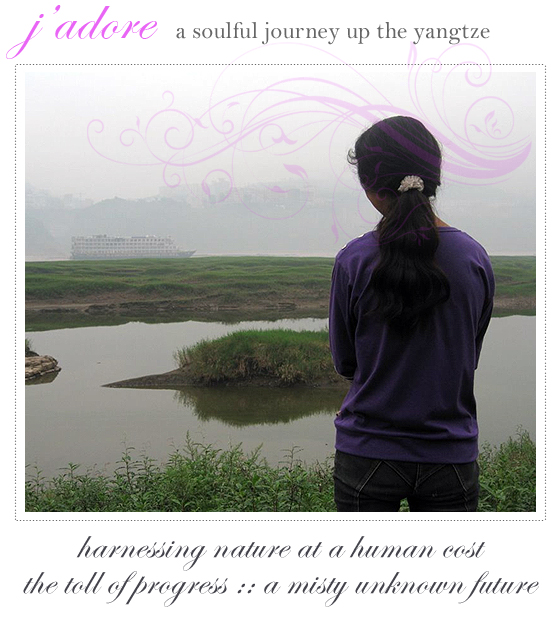
This Bird has always been fascinated by the sparkling truth of documentary films, as they highlight a little detail in the fabric of daily life, one that's often overlooked by the news, which seems to focus on singular cataclysmic events that are for the most part, momentary. Documentarians like Michael Moore gets a bit gonzo at times, so I've been gravitating towards smaller films that appear quiet on the surface, but a swirl of human debate lies below the calm. I remember seeing a preview for filmmaker Yung Chang's documentary, Up the Yangtze
Chang's story focuses on the consequences of China's Three Gorges Dam, a longtime project originally conceived during the days of Chairman Mao, and now reaches fruition in our current century. The dam's purpose is to harness the great Yangtze River and convert it into hydroelectric energy, addressing China's need for resources as a growing global power. Not all of its rural cities have electricity and the country still relies heavily on coal-burning; the need for alternative energy sources has been a longtime question weighing on the nation as a whole, and the Three Gorges Dam is one potential answer. It's an epic feat of engineering, but takes a steep human toll -- as a result of the dam and re-routing the river's flow, it's caused the water level to rise and flood many riverside cities, resulting in two million people being uprooted. Livelihoods have been lost for those who farmed on the river's banks, and many have been forcibly moved without proper recompensation from the government. The issue is monumental, there is no clear resolution, and the documentary Up the Yangtze offers small glimpses into a handful of lives that are directly affected by the dam and the future it promises.
The most poignant figures in the film are the Yu family, and their daughter Yu Shui, barely fourteen and having to take a job on one of the tourist cruise ships that ferry Western visitors up the river, wanting to see the lands before the Yangtze swallows them up forever. Yu Shui's parents are poor subsistence farmers, living on the river's edge with no electricity, but using the land to provide their food. The slowly rising water threatens to engulf their home, so they know it is only a matter of time before they must relocate, but that means moving into a city apartment at a higher cost of living, which they can't afford without having land to farm. It's a terrible Catch-22 the family faces, so this leads them to the reluctant and ironic decision to send their eldest daughter, Yu Shui, to get a job on the cruise ship and hopefully provide enough income to both support the family and her own dream to get a university education. You can't help but cringe at moments where the Western tourists dress up in silly costumes of imperial Chinese royalty for photos and eat like kings in the massive cruise ship dining hall. And then you see Yu Shui -- given a Westernized name, Cindy, like all the workers on the ship -- talking to her parents and marveling at being able to have the luxury of meat more than once a week. The job provides "Cindy" a steady income along with English lessons, things that could keep a roof over her family's head and potentially propel her own future, but at the cost of her personal identity and the adoption of Western consumerism habits that may spend the money before she has a chance to send it home.
Up the Yangtze paints a very real picture of China as a nation, not the pastoral landscape the government-run tourism industry would prefer the world to see. Not to say it's a completely unflattering portrait -- it's beautiful in its complexity, heartbreakingly poignant in the loss of history in the name of evolution, and unflinchingly handsome in its reality. There is no simple answer, and all you can do is weep for those who are crushed under the heavy wheel of progress, and wish good fortune on the next generation who will hopefully bring a better future for this rapidly-changing nation. It's a great documentary because it doesn't provide a clear resolution, merely provoke the deeper issue everyone must come to terms with regarding the Devil's bargain of economic passage and the inevitable toll it takes on humanity.
Jaunty Fine Print: photo from Up the Yangtze website




No comments:
Post a Comment
Merci buttercups! Your comments are appreciated! (hit the 'post comment' button twice, sometimes it's buggy)